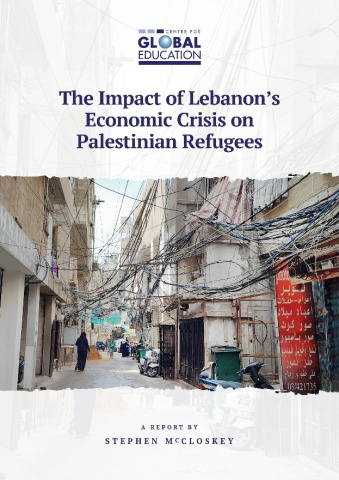
The Centre for Global Education has published a new report which assesses the impact of Lebanon’s four-year economic crisis on the socio-economic status of Palestinians. The report is based on field visits carried out in May, September and November 2022 to nine Palestinian refugee camps in Lebanon, which included consultations with UN staff and visits to camp installations, notably schools and health clinics. The report focuses specifically on the health, education and situational poverty of Palestinians in Lebanon since the precipitous collapse of Lebanon’s economy in 2019 which has seen a ninety percent depreciation of the country’s currency. The World Bank ranks the financial crisis in Lebanon among the worst economic crises globally since the mid-nineteenth century and the economic contraction experienced by the country as one ‘usually associated with conflicts or wars’.
Palestinians are on the frontline of Lebanon’s crisis. They were already excluded from 39 syndicated occupations in Lebanon and mostly consigned to employment in low paying jobs in the informal, unregulated economy. They have never been naturalised and are forced to live with a permanent foreigner status in Lebanon without the citizenship rights that could allow them to improve their lives. The United Nations Relief and Works Agency (UNRWA) estimates that 45 per cent of Lebanon’s 479,000 registered Palestinian refugees live in the country’s twelve refugee camps, which are densely populated and characterized by poor housing conditions, high unemployment, extreme poverty and a lack of dignity. The living conditions in the camps are contributing to chronic health problems including diabetes, hypertension and pulmonary diseases. The collapse of the Lebanese pound has greatly inflated the cost of medical drugs and, as Palestinians are not naturalised, they are ineligible for state-provided social services, including healthcare.
The cost of transport has increased by over 500 percent in Lebanon which has created unimaginable economic burdens on Palestinian families who want to keep their children in education but struggle to meet the costs. Palestinian children in Lebanese private schools have been withdrawn and transferred to UNRWA schools because their families can no longer meet the fees. But the biggest challenge faced by Palestinian families has been the spike in consumer prices caused by the economic crisis. A recent socio-economic survey carried out by UNRWA found that 93 per cent of Palestinians live below the poverty line and 62 per cent of families had reduced the number of meals consumed each day.
The escalating social and economic crises impacting Palestinians in Lebanon is increasing demand on services provided by UNRWA as the sole agency responsible for assisting Palestinian refugees when the Agency is itself experiencing an existential financial crisis. The Centre for Global Education’s report calls on Irish Aid to increase its contribution to UNRWA’s humanitarian activities in Lebanon. It also urges the Department of Foreign Affairs to call on the Lebanese government to end the discrimination experienced by Palestinian refugees by providing them with an equal right to nationality, education and formal employment. This could potentially enhance their social and economic status in Lebanon and would enable Palestinians to make a larger contribution to the Lebanese economy.
However, the most just and sustainable solution to the Palestinian refugee crisis in Lebanon lies in ensuring that Israel respects the right of Palestinian refugees to return home as established in Article 13(2) of the 1948 Universal Declaration of Human Rights and United Nations General Assembly Resolution 3236. The latter reaffirms ‘the inalienable right of the Palestinians to return to their homes and property from which they have been displaced and uprooted’.
Stephen McCloskey,
Director, Centre for Global Education
The Centre for Global Education’s report is available at: https://www.centreforglobaleducation.com/sites/default/files/Lebanon%20Rep%20Final%20MAY%202023.pdf





